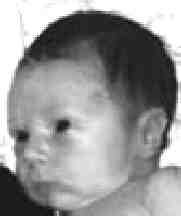|
Over the next six weeks, the family went to weekly pediatrician visits. Baby Alan was seriously jaundiced during his entire neonatal period, and was still rasping and grunting with short periods of apnea. In addition, on November 2, 1997, Alan and Francine rushed the baby to the hospital late in the night because they noticed blood on a burp rag. He was examined by several doctors and nurses, and it was decided that he must have scratched the inside of his nose with his fingernails. Francine pointed out that his fingernails were very trimmed and that, as a preemie, her baby didn't have such muscle control to have scratched himself. However, the doctors disregarded the concerns, and remarks were made about being "overprotective parents."
On November 11, 1997, at his weekly pediatrician visit, baby Alan was still not well: He was congested, rasping and grunting, and he had abnormal bowel movements. Despite this and other concerns, such as prematurity, he was injected with six vaccines. Within 24 hours he became lethargic, feverish, fussy. His feeding and sleeping patterns were markedly reduced and changed. The doctor warned that he could be this way for a week or so, but not to worry because it’s “normal” for some babies after their vaccinations. This desensitized the parents to those reactions.
Over the next ten days, baby Alan's condition did not improve, and he then developed a high-pitched cry. Francine and Alan became concerned, but the doctor said this was normal, and they'd already been chastised for being “overprotective.” On November 23, 1997, they decided that if baby Alan did not improve, they would take him to the pediatrician the next day after Francine returned from work. They never got the chance.
On November 24, 1997, in the late morning hours, Francine Yurko kissed her family good-bye and went to work, leaving Alan, the baby, and their four-year-old daughter at home. Alan was a loving and patient dad. He loved to give baths, changed most diapers, and had a special knack for “baby talk.” That morning, after feeding baby Alan, it was time to change the diaper. Alan and the baby's sister began the routine. Alan and Francine always involved their daughter in the care of her brother to minimize any sibling rivalry and establish a bond. Unfortunately, that diaper didn't get changed.
Baby Alan spit up and stopped breathing. Alan attempted mouth-to-mouth and tried to clear any blockage potentially causing his son to stop breathing. He rushed him to the hospital ER at Princeton Hospital in Orlando, where, after great struggle and mishaps, his son was resuscitated. Francine arrived, and they tearfully embraced one another as they waited to be informed on their son's condition.
Baby Alan was then transported to Florida Hospital, which was better equipped to handle the situation and where a ventilator was helping him to breathe. After 12 hours of waiting, the doctor told Alan and Francine that their baby had brain bleeding and rib calluses, which were probably from old fractures. The shock was too much for Francine, and she was sedated. Alan disbelieved the doctor's diagnosis, and asked him to double check to see if he had the right baby. After all, baby Alan had spent a lot of time with many doctors and nurses in his short life, and how could they not have noticed broken ribs?
At approximately 2 a.m. on November 25, 1997, detectives Hinkey and Carson of Orlando Homicide asked to question Alan. The police suggested all sorts of explanations when inquiring about what caused the baby's condition, to which Alan listened and responded, but never gave an explanation. Alan and Francine had no clue to as to what caused their son's condition. Alan maintained that he had no idea how his son's injuries happened. Over and over, he stated that neither he nor anyone had ever shaken or dropped the baby. He was in a state of shock and disbelief as to what was happening.
Alan was arrested less than 48 hours later after police mistook him for a fugitive named Michael Yurkiew. Federal agents eventually established that it was a mistake. However, this false arrest created an initial bias against Alan that contributed to the upcoming denial of justice.
|
